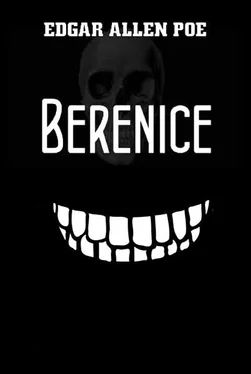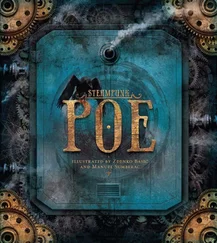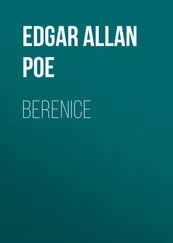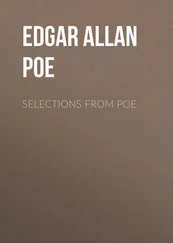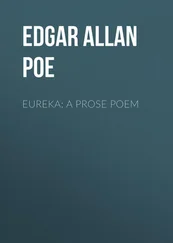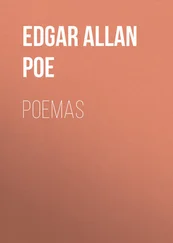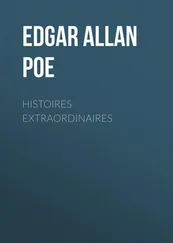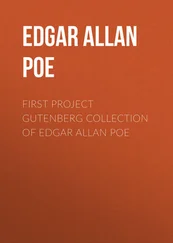With a heart full of grief, yet reluctantly, and oppressed with awe, I made my way to the bed-chamber of the departed. The room was large, and very dark, and at every step within its gloomy precincts I encountered the paraphernalia of the grave. The coffin, so a menial told me, lay surrounded by the curtains of yonder bed, and in that coffin, he whisperingly assured me, was all that remained of Berenice. Who was it asked me would I not look upon the corpse? I had seen the lips of no one move, yet the question had been demanded, and the echo of the syllables still lingered in the room. It was impossible to refuse; and with a sense of suffocation I dragged myself to the side of the bed. Gently I uplifted the sable draperies of the curtains.
As I let them fall they descended upon my shoulders, and shutting me thus out from the living, enclosed me in the strictest communion with the deceased.
The very atmosphere was redolent of death. The peculiar smell of the coffin sickened me; and I fancied a deleterious odor was already exhaling from the body. I would have given worlds to escape — to fly from the pernicious influence of mortality — to breathe once again the pure air of the eternal heavens. But I had no longer the power to move — my knees tottered beneath me — and I remained rooted to the spot, and gazing upon the frightful length of the rigid body as it lay outstretched in the dark coffin without a lid.
God of heaven! — is it possible? Is it my brain that reels — or was it indeed the finger of the enshrouded dead that stirred in the white cerement that bound it? Frozen with unutterable awe I slowly raised my eyes to the countenance of the corpse. There had been a band around the jaws, but, I know not how, it was broken asunder. The livid lips were wreathed into a species of smile, and, through the enveloping gloom, once again there glared upon me in too palpable reality, the white and glistening, and ghastly teeth of Berenice. I sprang convulsively from the bed, and, uttering no word, rushed forth a maniac from that apartment of triple horror, and mystery, and death.
* * *
I found myself again sitting in the library, and again sitting there alone. It seemed that I had newly awakened from a confused and exciting dream. I knew that it was now midnight, and I was well aware that since the setting of the sun Berenice had been interred. But of that dreary period which had intervened I had no positive, at least no definite comprehension. Yet its memory was rife with horror — horror more horrible from being vague, and terror more terrible from ambiguity. It was a fearful page in the record of my existence, written all over with dim, and hideous, and unintelligible recollections. I strived to decypher them, but in vain — while ever and anon, like the spirit of a departed sound, the shrill and piercing shriek of a female voice seemed to be ringing in my ears. I had done a deed — what was it? And the echoes of the chamber answered me — “what was it?”
On the table beside me burned a lamp, and near it lay a little box of ebony. It was a box of no remarkable character, and I had seen it frequently before, it being the property of the family physician; but how came it there upon my table, and why did I shudder in regarding it? These things were in no manner to be accounted for, and my eyes at length dropped to the open pages of a book, and to a sentence underscored therein. The words were the singular but simple words of the poet Ebn Zaiat. “ Dicebant mihi sodales si sepulchrum amicæ visit arem curas meas aliquantulum fore levatas .” [2] My companions told me I might find some little alleviation of my misery, in visiting the grave of my beloved.
Why then, as I perused them, did the hairs of my head erect themselves on end, and the blood of my body congeal within my veins?
There came a light tap at the library door, and, pale as the tenant of a tomb, a menial entered upon tiptoe. His looks were wild with terror, and he spoke to me in a voice tremulous, husky, and very low. What said he? — some broken sentences I heard. He told of a wild cry heard in the silence of the night — of the gathering together of the household — of a search in the direction of the sound — and then his tones grew thrillingly distinct as he whispered me of a violated grave — of a disfigured body discovered upon its margin — a body enshrouded, yet still breathing, still palpitating, still alive!
He pointed to my garments — they were muddy and clotted with gore. I spoke not, and he took me gently by the hand — but it was indented with the impress of human nails. He directed my attention to some object against the wall — I looked at it for some minutes — it was a spade. With a shriek I bounded to the table, and grasped the ebony box that lay upon it. But I could not force it open, and in my tremor it slipped from out my hands, and fell heavily, and burst into pieces, and from it, with a rattling sound, there rolled out some instruments of dental surgery, intermingled with many white and glistening substances that were scattered to and fro about the floor.
For as Jove, during the winter season, gives twice seven days of warmth, men have called this clement and temperate time the nurse of the beautiful Halcyon. — Simonides .
My companions told me I might find some little alleviation of my misery, in visiting the grave of my beloved.
